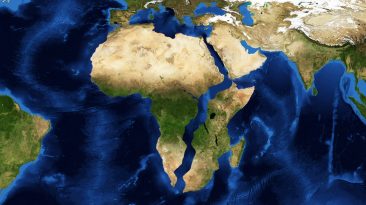Gravity, in the literal sense, keeps everyone (and everything) on Earth grounded. It acts as the anchor that prevents objects from floating skyward.
For humans, it’s a leash that stops us from straying too far away from the planet’s surface. Ever had a hard time climbing up a hill? Or had a bad fall? Gravity is what glues you to the ground and keeps you from floating away from it.
What if one day it just stopped working and the whole world experienced zero gravity? How would your body react?
Would you fly off the planet? What would happen to Earth?
While bouncing off the ceiling may sound fun, there would be a lot of consequences if we lost gravity’s grip on our bodies… Gravity is an attraction that keeps us on Earth, and keeps Earth orbiting the Sun.
Even the atoms in your body exert gravity…. and are gravitationally attracted to the atoms of the person sitting next to you.
If one day this force came to an end…Zero gravity. Would it kill you?
While the idea of free-floating down to neighborhood pub and drinking a pint of yeasty goodness pooled together like an alcohol-filled bubble in mid-air might seem like fun, there’s much more to gravity than just stopping us from “getting the floats.”
Gravity is the weakest sibling of the four basic forces that help make our universe what it is. Two of those forces, gravity and electromagnetism, are visibly seen at work every day.
As mentioned, gravity keeps us in place. It’s also why planets are in motion around the sun and is the brute strength behind the formation of new planets and stars.
Electromagnetism is put to use in many household products that require an electrical current or battery to operate, and involves how matter interacts with electricity and magnetism. Then we the two forces that never get the spotlight – strong and weak nuclear force. Their worlds exist inside the nuclei of atoms, and as the saying goes: out of sight, out of mind.
First, we’re going to limit the gravity-on-strike scenario to Earth only. Were it to be universe-wide, the effect on our sun alone would be drastic enough to cause it to violently explode in mere minutes and shower the galaxy with super-heated gas.
And that just means instantaneous death for everyone, so let’s stick to our planet for now. As gravity vanished and the Earth kept spinning, that sensation of floating always associated with Zero G scenarios wouldn’t quite play out like that.
Instead, it would feel as though the Earth was falling out from underneath you, rather than you leaving the ground in slow motion. We can’t say whether our atmosphere would have the same physical sensation, but it would also be on the move.
As you’re watching your unplugged toaster float past you and marveling at the force of electromagnetism at work to get you your morning peanut butter and toast fix, so too would the atmosphere head upwards.
Here’s where the life-threatening trouble starts for us – we need the atmosphere to breath. Without a stable, “in-place” atmosphere, suffocation would be unavoidable.
So grab an oxygen tank and carry on, right? At this point, you’re probably realizing living on a gravity-free Earth isn’t as much fun as you thought, and you might be getting the cold sweats.
That sweat would pool up around you, and you’d start experiencing some of the inconveniences involved with intimate physical contact in space. Every second you are unconsciously working against the effects of Earth’s gravity.
Growing up on this planet, your body has adapted to pushing against the force of gravity as it constantly pulls you down. But without it, you’d start losing your bones!
That’s right… Astronauts lose at least 14% of their bone strength during a 6-month stay on a space station. The same thing would happen to your muscles. And if losing your biceps doesn’t scare you, think of the most hardworking muscle in your body. Your heart.
Every day it pumps almost 2,000 gallons (7,200 liters) of blood. To deliver blood to your brain, your heart has to push it vertically, overcoming the force of gravity. Without gravity, your heart would only supply your brain and chest with blood, not your legs and stomach. At least for a while, until your body could adjust to a new environment.
You’d lose your sense of balance, too. Circulation of your red blood cells would drop. This means your wounds would take longer to heal, and your immune system would weaken. But none of this would kill you. What would is the lack of air to breathe.
Oceans and rivers would mimic your sweat’s behaviour, but on a much grander scale.
Large bodies of water would leave the planet’s surface, breaking into smaller pools and continuing to break down the further they are from Earth.
Ocean creatures would be okay within these floating liquid cocoons, but unfortunately not for long. And since we also need water to survive, strap as many bottles of the stuff onto you as you can.
If you were in your house when the gravity switch was turned off, you’d be safe from a slow death drift, but only temporarily.
Despite the oxygen rig, the water supply and a roof (or in this case, a ceiling) bumping against your head, huge hunks of the Earth would start to break off and perpetually continue to downsize. Your house would act only as a false sense of security, since when it comes to gravity size doesn’t matter.
Gravity holds our planet’s atmosphere in place. With no force to keep it around Earth, the atmosphere would be the first thing to float into space. Followed by the oceans, seas and rivers… And you! Unless you were lucky enough to be inside a building that was firmly rooted to the ground, you’d take off for a lifetime interstellar vacation.
Just like anything else that wasn’t nailed down. Even Earth itself would break apart into chunks and drift away into space. If there was no gravity anywhere in the Universe, the same thing would happen to the Sun, and to all the stars, the planets and black holes. The entire Universe would turn into a floating soup of atoms and molecules. That would be the end of the world as we know it.
Earth with no gravity would not be Earth for long, so let’s all be thankful we have science to keep us firmly (and safely) rooted to the ground.
Sources
- The Fundamental Forces of Nature
- What would happen to you if gravity stopped working?
- What If There Were No Gravity?
- Life Without Gravity
- What Would Happen If Gravity Stopped?
- What would happen to a solar system if gravity suddenly stopped working?
- The History of Gravity
- What would happen if the Earth’s gravity suddenly disappeared?
- Einstein’s Theory of General Relativity
- Einstein’s Relativity Explained in 4 Simple Steps



























